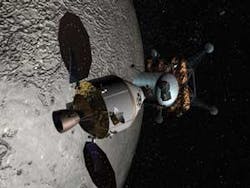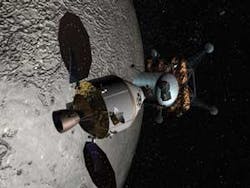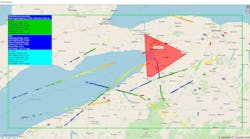By John McHale
WASHINGTON–NASA human space exploration programs, such as the Constellation program to return to the moon, receive increases in the 2010 NASA budget request, while space shuttle funding dwindles as NASA officials plan to retire the fleet in 2010.
Currently, the request calls for $3.96 billion for exploration in 2010 compared to $3.5 billion in the 2009 request. NASA’s overall 2010 budget request was for $18.69 billion, a five percent increase from 2009, according to a statement by acting NASA administrator Christopher Scolese.
Increased funding for human spacecraft translates into more opportunities for avionics, displays, computers, sensors, real-time software, and other electronics technologies essential to transporting humans from Earth to the International Space station, the moon, and other parts of the solar system.
NASA’s human space flight program is called Constellation. In the 2010 request, Constellation Systems receive 3.5 billion, up from $3.25 billion in 2009. The program is to increase each year with funding reaching $5.54 billion in 2012.
Under Constellation, two main spacecraft programs are receiving a large amount of funding–the Orion Crew Exploration Vehicle (CEV) and the Ares I Crew Launch Vehicle. Requested funding for the Orion CEV in 2010 remains steady at $1.383 billion. For 2011, it is to receive $1.938 billion in funding. Ares I Crew Launch Vehicle funding is up slightly for 2010 at $1.067 billion and is to increase to $1.42 billion in 2011.
Space shuttle funding gets a slight bump in the 2010 request, up to $3.16 billion from $308 million last year, but drops to $382 million in 2011 as it is decommissioned. It is retiring after 28 years, 133 missions and more than 650 days spent in orbit, with more than 500 million miles traveled in space, according to the NASA budget request.




